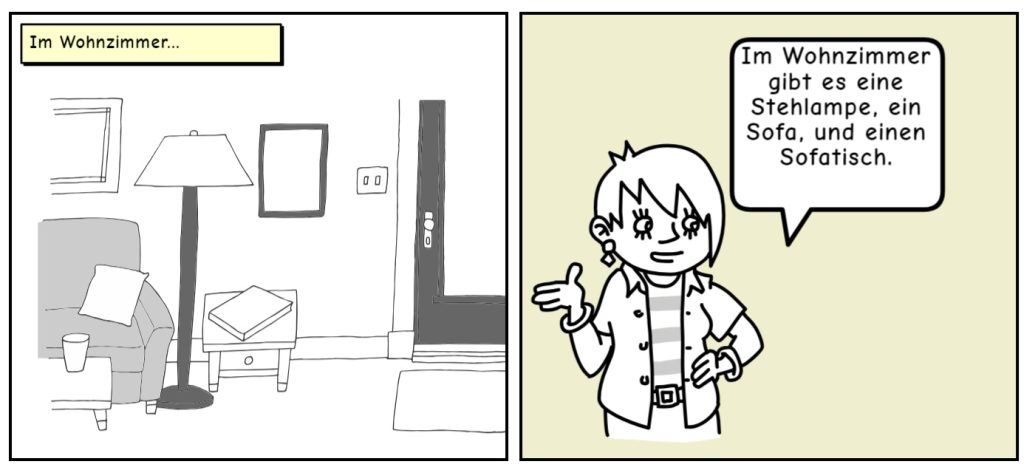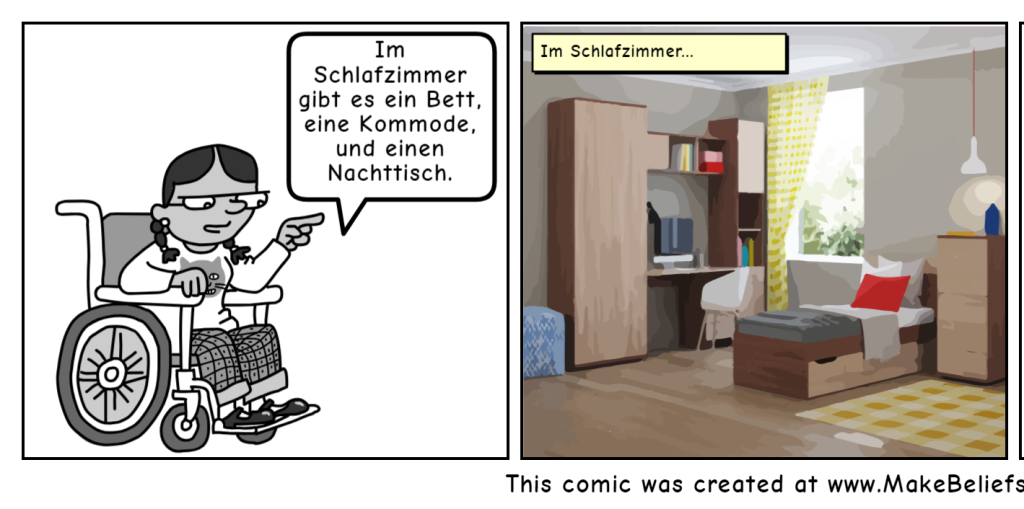1.2 Meine nächste Wohnung

Lektionsüberblick
For some, a home is a reflection of who they are and for others it is an entirely functional decision. Regardless, it’s important to be able to talk about our living spaces. In the end of this lesson, you will be able to 1) talk about the typical rooms in a house or apartment, 2) talk about the typical features and furniture, and 3) compare your current and future living spaces, and 4) detail the household items you will need to buy for your next home.
1) Die Zimmer
Using your experience with German and what you know about cognates (words that look the same in two languages), what German words below do you recognize? See how well you can complete the activity using your existing knowledge.
 |
|
 |
|
Jetzt bist du dran!
Welche Zimmer hast du in deiner Wohnung? Write your answer in your journal. Be sure to include the der/die/das in front of the word.
In your audio journal, practice saying your list of words aloud.
2) Die Zimmerausstattung
What types of features do your rooms have? Let’s build your vocabulary with these flash cards and exercises, then move through each room to learn more specific amenities.
Kleiner Hinweis
| For those who live in buildings with multiple floors (floor = Stock oder Etage), it’s important to note that in German, the floors are counted differently than they are in the United States. | US first floor | das Erdgeschoss |
| US second floor | die erste Etage/der erste Stock | |
| US third floor | die zweite Etage/der zweite Stock |
You can see and hear the difference in this short video from DKH Institut.
das Schlafzimmer
Was ist dein Lieblingszimmer? Das Schlafzimmer vielleicht? Listen and read the most important elements of a bedroom[1]. Some additional vocabulary can be found in the Hinweis box below.
Kleiner Hinweis
Remember that German is famous for its compound words (Komposita). Look at the way the words for different types of Tische (tables) und Bette (beds) are formed. Can you guess what some of these words might mean?
| der Nachttisch
der Schreibtisch der Schminktisch |
nightstand
desk vanity |
das Einzelbett
das Doppelbett das Etagenbett |
single bed
double bed bunkbed |
das Badezimmer
What parts of the bathroom do you already know? Vielleicht die Toilette oder die Dusche? Look at the picture and match what you know.
die Essküche
Look around your living room. Do you have the following items? Be sure to click through to each slide[3].
Was hast du sonst noch? Vielleicht einen Fernseher, eine Spielkonsole, oder einen Schreibtisch? (TV, gaming console, desk)
die Terrasse/der Balkon
Many Germans love their balcony or terrace because they can have small gardens. Siehst du im Bild Gartenstühle oder einen Gartentisch?
 |
|
der Wäschekeller/die Waschküche
| The laundry room is quite simple. In dem Wäschekeller gibt es die Waschmaschine und den Trockner.
Let’s practice! |
|
Do you remember where everything goes? Test your knowledge!
Watch the following interview about a Lieblingszimmer and answer the questions below.
|
|
Was hat du in deinem Lieblingszimmer? What do you have in your favorite room? Read and listen to the comics below.
 |
|
 |
Now let’s practice building sentences.
Jetzt bist du dran!
Was ist dein Lieblingszimmer? Was gibt es darin? In your written journal, answer the question about your favorite room using the modeled language above. Then practice saying your sentence(s) aloud. When you are ready, record it in your audio journal.
3) Meine Wohnung – heute und morgen
Wie ist deine Wohnung jetzt? Wie wird deine künftige Wohnung sein? Read, listen, and repeat how Sara answers.
 |
Jetzt… | In der Zukunft… |
| Zurzeit habe ich eine gemütliche Wohnung in der Nähe von der Uni. Ich habe ein Wohnzimmer, ein Schlafzimmer und eine ziemlich kleine Küche. Es gibt auch ein kleines Badezimmer. Der Flur verbindet alle Zimmer. | Nach dem Studium werde ich eine größere Wohnung haben. Ich werde zwei Schlafzimmer haben, weil ich eine Mitbewohnerin haben möchte. Ich möchte auch eine Terrasse und eine Waschküche haben. |
Deutsche Welle has a great series called Nicos Weg. You can watch the following episodes to get a feel for living arrangements, furniture, and life in Germany.
| Video 1: So wohne ich
Video 2: Meine Wohnung |
Video 3: Sofa, Sessel und Tisch
Video 4: Unser Haus |
Jetzt bist du dran!
Wie ist deine Wohnung? Wie wird deine zukünftige Wohnung sein? In your written journal, answer the questions about your current living space and your future one, using Sara’s descriptions as guides. Then practice saying your sentence(s) aloud. When you are ready, record it in your audio journal.
4) Ich werde…kaufen
Was wirst du für deine zukünftige Wohnung kaufen? Thinking ahead, what household items will you need for your future living space? Pretend you’ve found the image below on Pinterest, and you plan to buy the items that you see. Mentally name the household items in the picture. Then complete the activity.
 |
|
Jetzt bist du dran!
Was wirst du für deine zukünftige Wohnung kaufen? Imagine you are going shopping for furniture at IKEA (yes, IKEA is in Germany, too). You have made a list of items and want to tell your German-speaking roommate what you intend to buy. Write your list of household items and then tell your roommate your plans to buy each item by saying, Ich werde [item] kaufen. When you are ready, record your buying intentions in your audio journal.
Jetzt kombinieren!
In the previous lesson, you learned to describe the type of building you live in. In this lesson, you learned to 1) talk about the typical rooms in a house or apartment, 2) talk about the typical features and furniture, and 3) compare your current and future living spaces, and 4) detail the household items you will need to buy for your next home.
Let’s combine the information from both lessons, like this:
- Ich wohne in einer Wohnung in einem Hochhaus.
- Ich habe eine Essküche, ein Wohnzimmer, drei Schlafzimmer, und ein Badezimmer. Ich habe eine kleine Terrasse. Ich habe keinen Wäschekeller.
- Das Wohnzimmer ist mein Lieblingszimmer. Im Wohnzimmer gibt es ein grünes Sofa, einen schwarzen Sessel, einen dunkelgrünen Teppich, einen schwarzen Sofatisch, eine schwarze Lampe und drei Pflanzen.
- Nach dem Studium werde ich in einem großen Einfamilienhaus mit drei Schlafzimmern, zwei Badezimmern, einer Garage und einem Balkon wohnen.
- Für meine zukünftige Wohnung werde ich einen Teppich und Designer-Möbel kaufen.
Wo wohnst du? Welche Zimmer hast du? Was für Möbel und Zimmerausstattung hast du schon? Was wirst du in der Zukunft haben? Answer these questions modeled after the examples above.
Then record yourself in your audio journal. Be sure to listen to your recording and rerecord, if you are not satisfied.
Before you go: Check out this video featuring differences between Standard German and Liechtenstein German.

Media Attributions
- 2030-2040 fl banner large is licensed under a CC BY-NC-SA (Attribution NonCommercial ShareAlike) license
- Image of Hannah from Grenzenlos Deutsch is licensed under a Creative Commons Attribution-NonCommercial-ShareAlike 4.0 International License is licensed under a CC BY-SA (Attribution ShareAlike) license
- Image of Achim from Grenzenlos Deutsch is licensed under a Creative Commons Attribution-NonCommercial-ShareAlike 4.0 International License is licensed under a CC BY-SA (Attribution ShareAlike) license
- Photo of Balkon by 4028mdk09, CC BY-SA 3.0, via Wikimedia Commons
- Im Wohnzimmer comic made at wwww.MakeBeliefsComix.com © This comic strip was generated at http://www.MakeBeliefsComix.com. Used by permission of author and site creator Bill Zimmerman.
- Im Schlafzimmer comic made at www.MakeBeliefsComix.com © This comic strip was generated at http://www.MakeBeliefsComix.com. Used by permission of author and site creator Bill Zimmerman.
- Photo by pexels-shvetsa-12662863
- living-room-2732939_1280
- Schlafzimmer slideshow from Willkommen: Deutsch für alle Copyright © 2020 by Claudia Kost and Crystal Sawatzky, licensed under a Creative Commons Attribution-NonCommercial-ShareAlike 4.0 International License, ↵
- Essküche activity by Willkommen: Deutsch für alle Copyright © 2020 by Claudia Kost and Crystal Sawatzky, licensed under a Creative Commons Attribution-NonCommercial-ShareAlike 4.0 International License ↵
- Wohnzimmer presentation by Willkommen: Deutsch für alle Copyright © 2020 by Claudia Kost and Crystal Sawatzky, licensed under a Creative Commons Attribution-NonCommercial-ShareAlike 4.0 International License ↵

